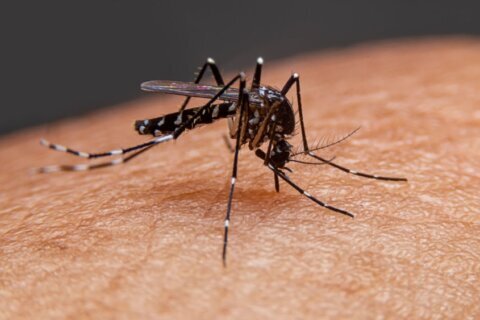A confirmed case of Eastern equine encephalitis, or “Triple E,” prompted some Massachusetts towns to restrict activities outside and close parks after dusk.
In Maryland, public health officials monitor mosquito populations, and haven’t had a confirmed case in decades.
“It’s something we’re watching and monitoring very closely,” said Dr. David Crum, a state public health veterinarian with Maryland’s Department of Health.
“Thankfully, Eastern equine encephalitis here in Maryland, or within the area, is a really rare disease,” Crum told WTOP.
The last confirmed case transmitted by a mosquito was in 1989.
In 2017, there was an equine encephalitis case that was not mosquito-borne, but was associated with a transplant procedure, Crum said.
The disease is serious. Most people never develop symptoms, but among those who contract encephalitis, there is a 30% fatality rate.
Symptoms include fever, vomiting, headaches, muscle aches, fatigue and, in some cases, seizures and coma, according to the Maryland Department of Health. Anyone who develops those symptoms should contact their health care provider.
On Monday, Maryland reported a confirmed case of West Nile virus, which, like equine encephalitis, is transmitted by infected mosquitoes.
West Nile virus was first recorded in the U.S. in 1999, according to MDH. In 2023, seven people across the country were positive for West Nile virus.
According to the state health department, 80% of people who are infected with West Nile virus will not have any symptoms, but for anyone with underlying health conditions, West Nile virus can cause serious illness.
Crum said the key to dealing with mosquito-borne diseases is prevention: “Like using EPA-registered insect repellents.”
He also recommended “wearing that protective clothing, long-sleeved shirts, pants, the treated clothing with permethrin,” and he said homeowners should check their doors and windows to see that their screens don’t have any gaps or holes.
Crum also recommended checking your yard for areas that could harbor mosquitoes.
“Tip and toss,” he said, referring to items that could collect water. “Flower pots, buckets, things like that, tip them at least once a week.”
Get breaking news and daily headlines delivered to your email inbox by signing up here.
© 2024 WTOP. All Rights Reserved. This website is not intended for users located within the European Economic Area.








